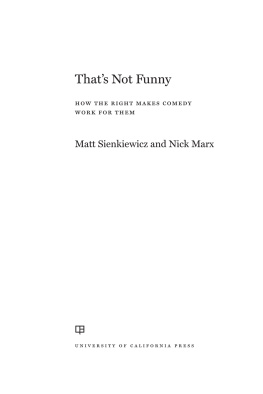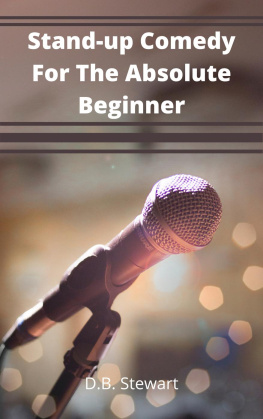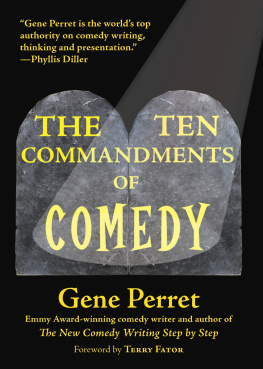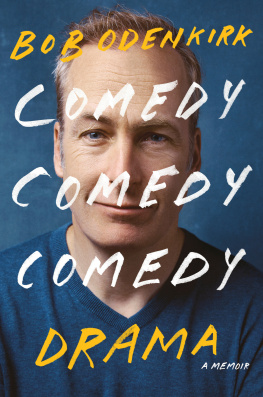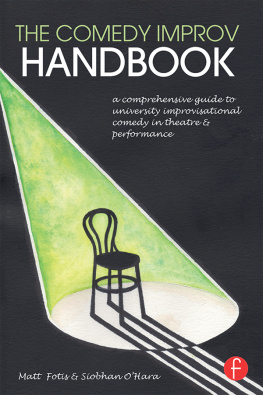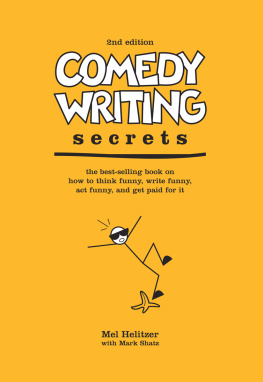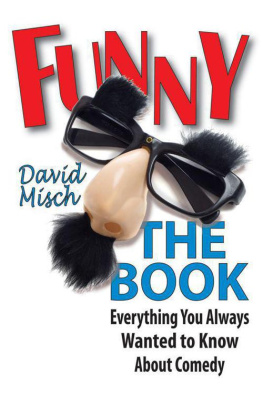Thats Not Funny
Thats Not Funny
HOW THE RIGHT MAKES COMEDY WORK FOR THEM
Matt Sienkiewicz and Nick Marx

UNIVERSITY OF CALIFORNIA PRESS
University of California Press
Oakland, California
2022 by Matt Sienkiewicz and Nick Marx
Library of Congress Cataloging-in-Publication Data
Names: Sienkiewicz, Matt, author. | Marx, Nick, author.
Title: Thats not funny : how the right makes comedy work for them / Matt Sienkiewicz and Nick Marx.
Description: Oakland : University of California Press, 2022. | Includes bibliographical references and index.
Identifiers: LCCN 2021047030 (print) | LCCN 2021047031 (ebook) | ISBN 9780520382138 (cloth) | ISBN 9780520382145 (epub)
Subjects: LCSH: ComedyPolitical aspectsUnited States. | Right-wing extremistsUnited States. | Political satire, AmericanUnited States. | Political cultureUnited States.
Classification: LCC PN 1929. P 65 S 54 2022 (print) | LCC PN 1929. P 65 (ebook) | DDC 817/.609dc23/eng/20211206
LC record available at https://lccn.loc.gov/2021047030
LC ebook record available at https://lccn.loc.gov/2021047031
Manufactured in the United States of America
30 29 28 27 26 25 24 23 22
10 9 8 7 6 5 4 3 2 1
Contents
Acknowledgments
We wish to express sincere gratitude to our families, colleagues, and to everyone who supported this book: Raina Polivka and Madison Wetzell at University of California Press; developmental editor Christopher Lura; indexer Cynthia Savage; research assistants Josh Moss, Maya Rao, Kiah Bennett, Jaren Zinn, and Kelly Chapple; and peer reviewers Viveca Greene and Amber Day.
Introduction
RIGHT-WING COMEDY: THATS NOT FUNNY
Thats not funny is a powerful, complicated thing to say. It can be an opinion stated as a fact. It can be a motion to dismiss. It can be, and often is, a moral judgment aimed at others or even at ones self: a tsk tsk for laughing when you shouldnt. When liberals discuss right-wing comedy, thats not funny is always lurking around the corner, ready to deploy one or all of its potential meanings in conversational combat.
Often, liberals use thats not funny to express a bored disinterest in conservative attempts at humor. This book will introduce a number of new, odd, and sometimes terrifying right-wing comedians doing reactionary jokes. Nonetheless, a lot of mainstream, high-profile right-wing humor is simply stuff from the past dragged into the present, a beat-up old Cadillac trying to turn heads with a new coat of paint. Think of Tim Allen, star of the 1990s sitcom Home Improvement, resurrecting his macho dad schtick with the MAGA-fied, Trump-friendly sitcom Last Man Standing. Politics aside, the retread nature of much right-wing comedy just isnt funny to people with less paleolithic tastes in humor.
There is also, however, a blithe, dismissive way in which thats not funny frames right-wing comedy. If something does not or, even better, cannot exist, then surely no one needs to worry about it being funny. The prevalence of this approach to right-wing comedy became apparent as soon as we dared admit to our fellow liberals that we were working on this book. The mere mention of right-wing comedy provoked raised eyebrows and dropped jaws during our countless Zoom calls throughout the pandemic. We were, it seemed to many, playing with an obvious oxymoron, a phantasm. Instead of wasting our time with an impossible combination of humor and politics, perhaps we should instead take a close look at unicorn mating rituals or investigate the finer points of plumbing infrastructure in the underwater city of Atlantis. Such topics, we were told, are no less absurd than right-wing comedy. Better yet, they can be studied without suffering through a single Ben Shapiro video, let alone the hundreds we had to endure. In other words, for some, there is simply a definitional contradiction between conservatism and comedy.
And then there is, of course, the moral approach to thats not funny-ing away right-wing comedy. This book delves into the depths of right-wing humor, taking readers into comedy crevices that make traditional dirty jokes look like kindergarten curriculum. And its not much better at the surface-level of the right-wing comedy world. Even Tim Allens banal brand of broadcast television humor trades in jokes based in racial stereotypes, smug sexism, and barely disguised homophobia. If something is morally abhorrent, why should liberals allow the possibility that it is also, for conservatives, funny?
But closing our eyes doesnt make the monster go away. Dismissing right-wing comedy with any species of thats not funny means overlooking the growing influence of conservative comedians, and it encourages a fundamental misunderstanding about the nature of contemporary politics and entertainment. Take Fox Newss Greg Gutfeld, for example. For years, he hosted The Greg Gutfeld Show, a weekly conservative Daily Show knock-off featuring cheaply produced satirical sketches, strained right-wing monologues, and celebrity guests unknown to most readers of this, or really any, book. It sounds, we admit, dismissible. The shows ratings, however, tell a different story. By the time he transitioned to the nightly Gutfeld! in 2021, he was consistently outperforming liberal late-night luminaries like Trevor Noah and Stephen Colbert. Clearly, Gutfelds comedy appeals to a considerable audience, expanding Fox Newss content and offering new ways for people to understand their identity as a conservative in America. Furthermore, as we show throughout this book, Gutfeld is ensconced in a constellation of right-wing comedy that goes well beyond the confines of Fox News and wields considerable cultural and economic power. For people who disagree with Gutfeld politically, his jokes are not funny at all. In fact, they should be taken quite seriously.
Outside of this book, serious analyses of Allen and Gutfeld are extremely rare. Even humor scholars fall into this blind spot. Academics tend to write about the many successful comedians who fit their liberal sensibilities: Jon Stewart, Trevor Noah, Stephen Colbert, and Samantha Bee, for example. When scholars do cite right-wing comedy, it is almost always to point out its failures. For example, in 2007 Fox News ran an ill-conceived, poorly rated news satire called The Hour News Hour for a few months. For many on the left, this failure is still an exemplar of right-wing comedy, despite its fleeting, forgettable place in TV history.
The comedy institutions we examine in this book are not forgettable footnotes, regardless of their moral or aesthetic failings. They are established, viable elements of the world of contemporary comedy as well as, in some cases at least, innovation hubs for truly pernicious right-wing ideologies. Greg Gutfeld dismisses racism and dabbles in sexism. He celebrates the most egregious actions and uncouth sentiments uttered by the likes of Donald Trump. And Gutfeld is one of the more innocuous ones. It gets worse, so much worse. The ways in which people discover new comedy todayalgorithmic suggestions on YouTube, retweets on Twitter, cross-promotion on podcastsprovide a set of pathways that connect more banal right-wing humor to the truly evil stuff, up to and including actual neo-Nazi comedy spaces. In a few clicks, one can move from Gutfeld on Fox News laughing at a story about immigrants, to a libertarian comedy podcaster interviewing a race scientist, to a song parody on YouTube of Oasiss Wonderwall featuring the line Today is gonna be the day / that were gonna fucking gas the Jews.
To be clear, this book considers a wide range of right-wing comedy, some of which will feature mild, clever, comedic insights. Other elements will be utterly revolting. It is not our goal to convince you that any of it is funny. We do, however, offer a forceful argument that none of it should be ignored. For years, the limited options of the American mediasphere left little room for right-wing comedy to become a significant economic and political force. Mainstream media tended to use comedy either to appease the moderate middle through sitcoms or to court somewhat younger, leftier viewers during late night. Outlets such as HBO and Comedy Central in particular aimed for more urban, educated audiences by offering countercultural fare. There was little room for anything else, instilling a sense that commercial comedy is perpetually and exclusively liberal.

